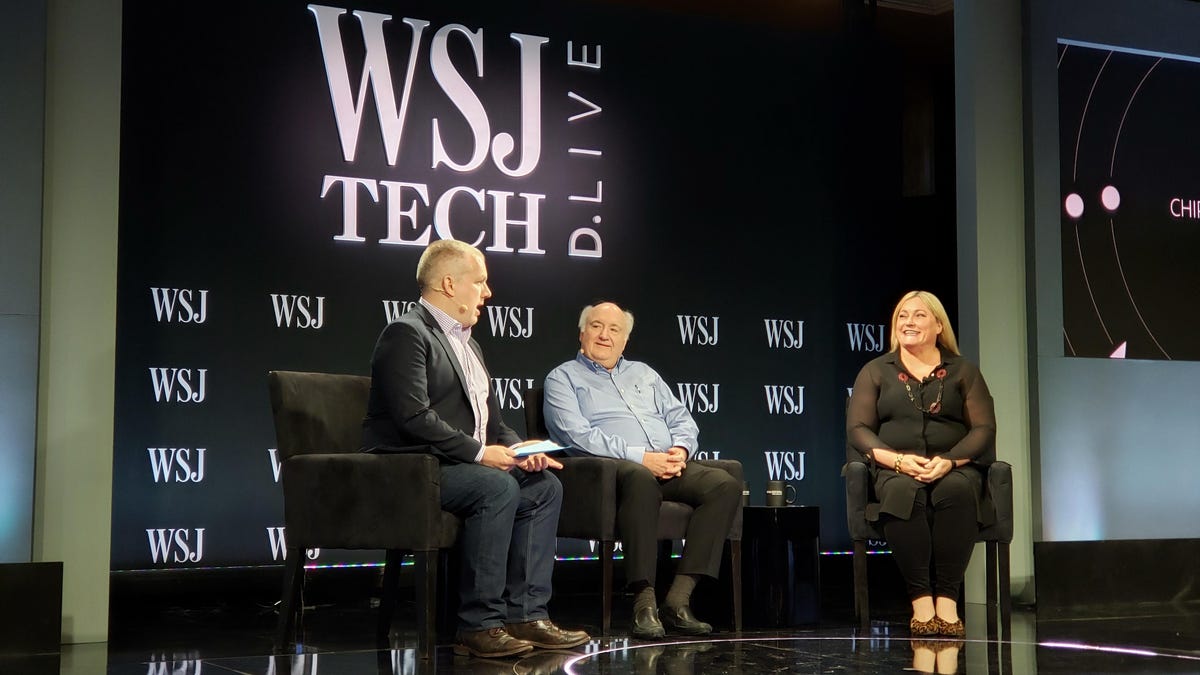Chinese server hack story doesn't convince chip CEOs
The heads of NXP and Ampere say it'd be impractical for China to insert spy chips into servers.

Renee James, the former president of Intel and current CEO of chip startup Ampere (right) and NXP CEO Richard Clemmer chat about the semiconductor industry with Jason Anders, WSJ news editor, at the WSJ D.Live conference.
Two chip CEOs said Tuesday that they didn't believe it was practical for China to insert spying chips into servers bound for US companies.
NXP CEO Richard Clemmer and Renee James, the former president of Intel and current CEO of data center chip startup Ampere, noted that semiconductor manufacturing is too complex, automated and secure for spy chips to be easily embedded onto technology without being noticed.
"The level of complexity is so high today that every piece of the complex -- a board or [system on a chip], whatever it is -- is meant to go with each other," James said Tuesday at The Wall Street Journal D.Live technology conference in Laguna Beach, California. "You don't just insert something."
She noted that even when she was president of Intel, or now, as CEO of Ampere, she wouldn't be able to walk into a manufacturing facility without being cleared.
"It's not just someone walks out to an assembly line," James said. "That's not how they're made."
NXP's Clemmer added that it's "not practical" to believe China is spying on companies by embedding chips on their technology.
A report from Bloomberg Businessweek last month said Chinese spy chips were allegedly used to gather intellectual property and trade secrets from Apple and Amazon Web Services, an Amazon subsidiary that provides cloud computing services. The chips were found in servers assembled in China for a US company called Super Micro, according to the report, and could've been subject to a secret US government investigation that began in 2015.
Apple immediately denied the report and even told Congress that it was never hacked. It also called for Bloomberg to retract its story, as did Amazon and Super Micro.
"I personally talked to the Bloomberg reporters along with Bruce Sewell, who was then our general counsel," Cook told BuzzFeed last month. "We were very clear with them that this did not happen, and answered all their questions. Each time they brought this up to us the story changed, and each time we investigated we found nothing."
The end of the Qualcomm deal
Meanwhile, NXP's Clemmer said on Tuesday that he had expected Qualcomm's acquisition of his company to close.
In July, Qualcomm's proposed $44 billion takeover of the Dutch chipmaker became a casualty of the US trade war with China. The deal had been on hold for nearly two years as China mulled the regulatory implications of the combined company. The belief over the summer was that if the US lifted its ban on Chinese telecommunications provider ZTE, China would approve Qualcomm's NXP acquisition. While ZTE got a reprieve, China ultimately didn't approve the acquisition.
"We felt like once ZTE was approved, it would have been an approval in exchange for the Qualcomm transaction to buy NXP," Clemmer said. "What we didn't envision was the power of some local Chinese companies whispering in the ears of Chinese regulators. What they didn't want to see was Qualcomm become even more powerful."
Qualcomm is the world's biggest provider of chips for mobile devices. With its acquisition of NXP, it also would've become a huge player in the market for automotive processors and other similar technology.
CNET's Holiday Gift Guide: The place to find the best tech gifts for 2018.
Best Black Friday 2018 deals: The best discounts we've found so far.

